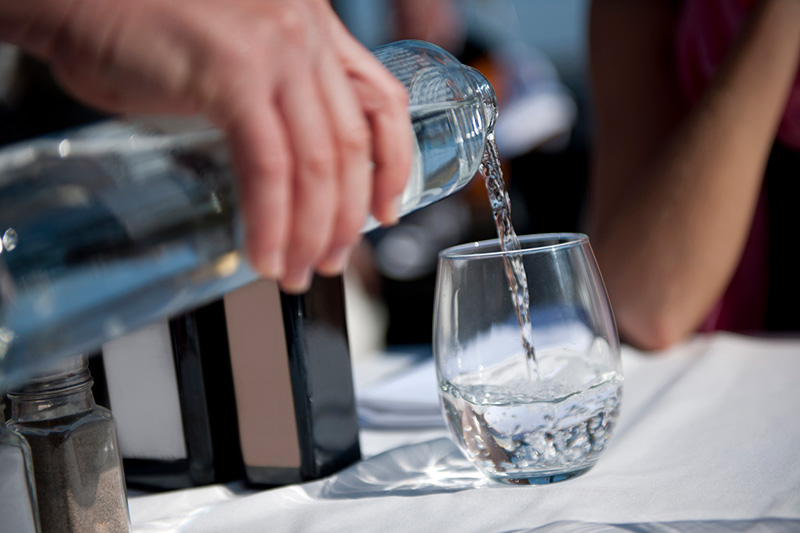If we can’t always have trust in the quality of water coming from the taps or wells, we can be proactive by knowing how to look out for contaminants so we may provide employees, customers, and our communities with pristine, safe water. Some key signs include:
Unpleasant Taste or Odour – If your tap water has an off-putting taste or smell, it’s a clear sign that filtration is needed. Customers and employees alike will notice and may avoid drinking the water, leading to increased bottled water costs and potential health concerns. (1)
Visible Contaminants – Sediment, rust particles, or other visible impurities in your water indicate the presence of contaminants that should be filtered out. These particles can not only affect taste but may also damage plumbing and equipment over time. (2)
Hard Water Deposits – White, chalky buildup on faucets, showerheads, and other water fixtures is a telltale sign of hard water. While not necessarily harmful to health, hard water can reduce the efficiency of water-using appliances and leave residue on glassware and dishes. (3)
Infrastructure issues commonly include:
Aging Plumbing System – Older buildings often have outdated plumbing that can introduce contaminants into the water supply. If your commercial property has an aging infrastructure, a filtration system can help mitigate potential water quality issues.
Frequent Plumbing Repairs – If you find yourself constantly dealing with clogged pipes or equipment breakdowns, it could be due to poor water quality. A filtration system can help protect your plumbing and extend the life of water-using equipment.
Environmental factors may include:
Local Water Quality Reports –Review your local water quality reports. If they consistently show high levels of contaminants or frequent water quality issues, it’s time to consider a filtration system for your business.
Geographic Location – Some areas are prone to specific water quality issues due to their geography. For example, regions with high mineral content in the soil may have harder water, while areas near industrial zones might have higher levels of chemical contaminants.
Some of the cost considerations include:
High Water Bills – If you’re noticing unusually high water bills, it could be due to inefficient water usage caused by poor water quality. A filtration system can help improve efficiency and potentially reduce costs in the long run. (2)
Frequent Equipment Replacement – Constantly replacing water-using equipment due to scale buildup or corrosion is a sign that your water quality is affecting your bottom line. A filtration system can help protect your investments and reduce replacement frequency. (4)
Conclusion
If employees or customers frequently comment on the poor taste or quality of your water, it’s a clear indication that you need to address the issue. The benefits of a commercial filtration system can help improve satisfaction and potentially boost your business reputation.
By paying attention to these signs, you can determine whether your business would benefit from a commercial water filtration system. Investing in water quality not only ensures the health and safety of your employees and customers but can also lead to cost savings and improved operational efficiency in the long run.
Why Choose Wentworth Plumbing?
Since 2006, Wentworth Plumbing has proudly served Ontarians with exceptional plumbing services. Our commitment to outstanding customer service, transparent communication, and skilled craftsmanship sets us apart. Contact us today to discover how we can assist you with your plumbing needs or schedule a service call with one of our licensed plumbers.
References
- https://www.quinnswater.ca/commercial-water-filtration
- https://nationalwaterservice.com/5-best-water-filtration-methods-for-commercial-properties/
- https://www.raynewater.com/blog/4-benefits-of-commercial-water-filtration-systems/
- https://www.solventum.com/en-us/home/purification-filtration/

